形容词和副词—语法知识梳理+专项集训及解析【中考英语 牛津深圳版】
文档属性
| 名称 | 形容词和副词—语法知识梳理+专项集训及解析【中考英语 牛津深圳版】 |
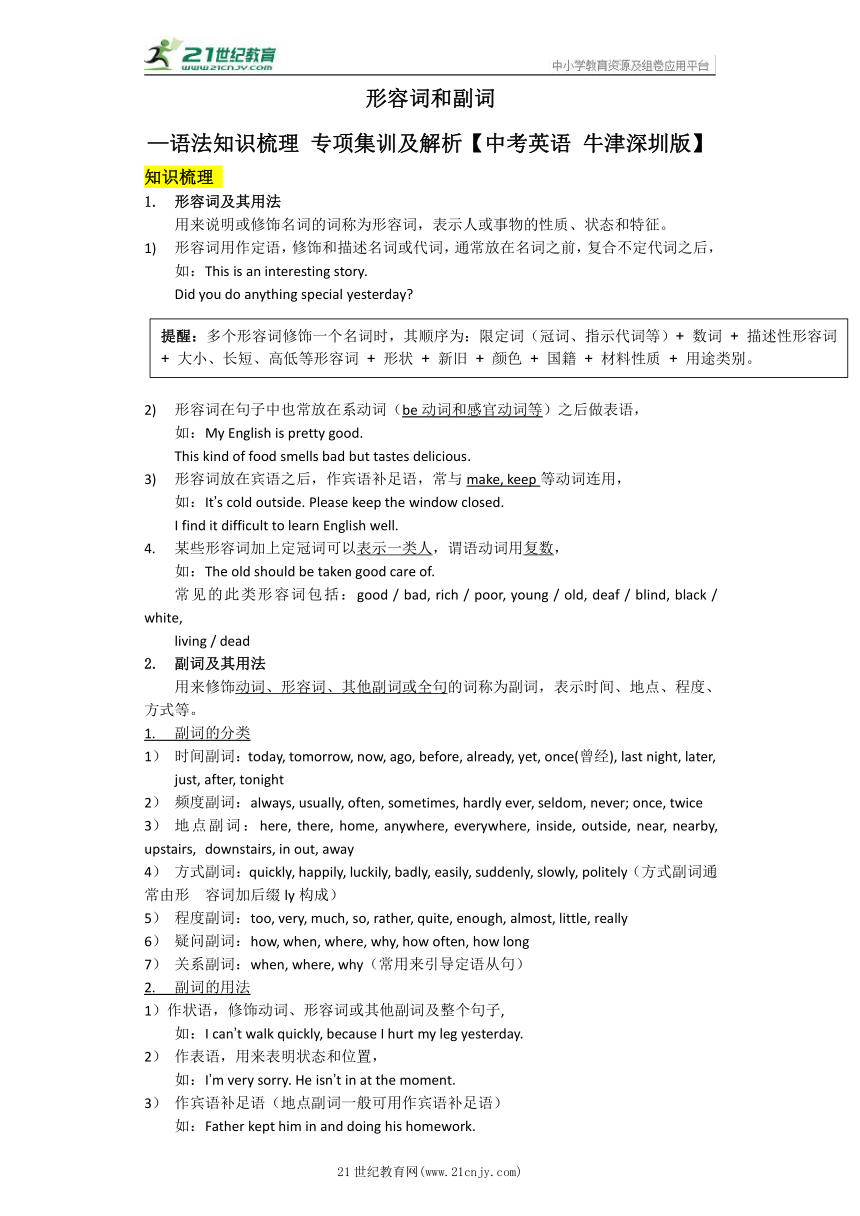
|
|
| 格式 | docx | ||
| 文件大小 | 48.8KB | ||
| 资源类型 | 试卷 | ||
| 版本资源 | 牛津深圳版 | ||
| 科目 | 英语 | ||
| 更新时间 | 2024-01-29 13:44:13 | ||
图片预览

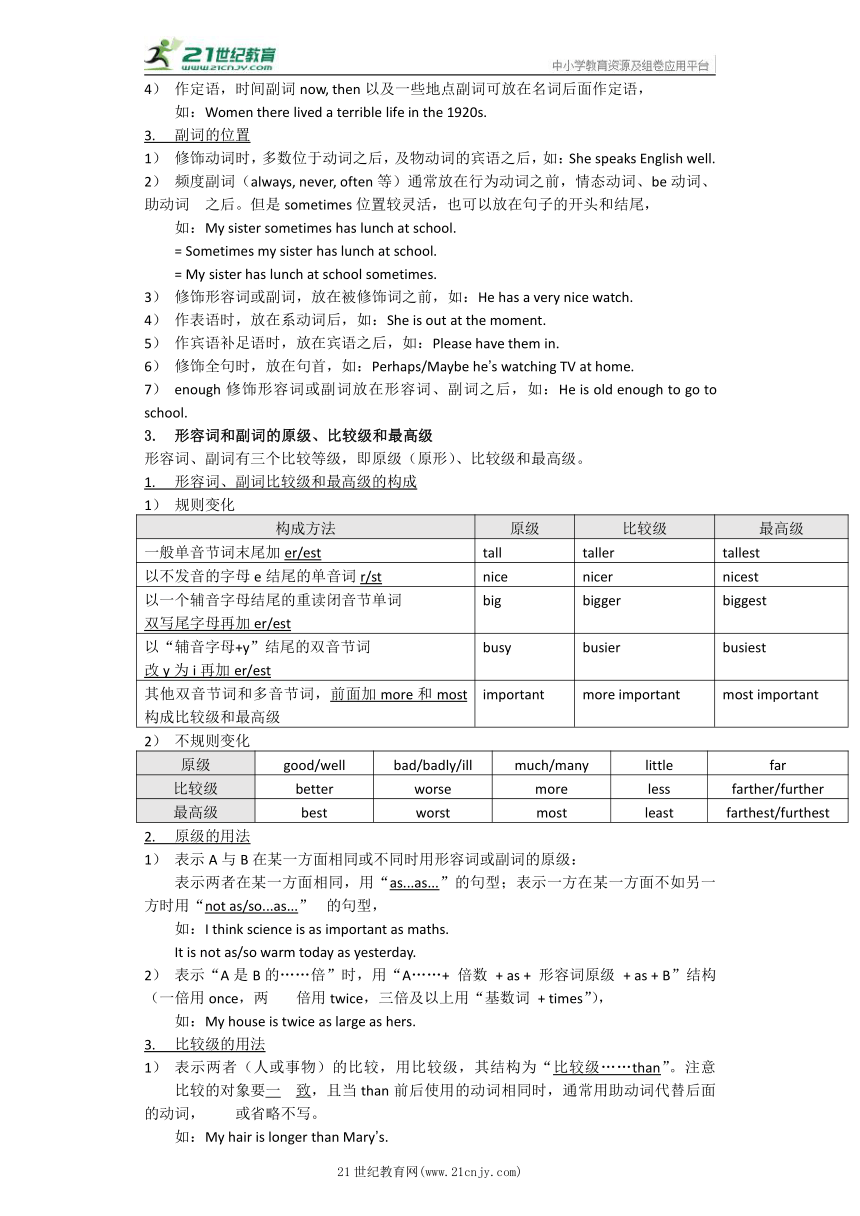
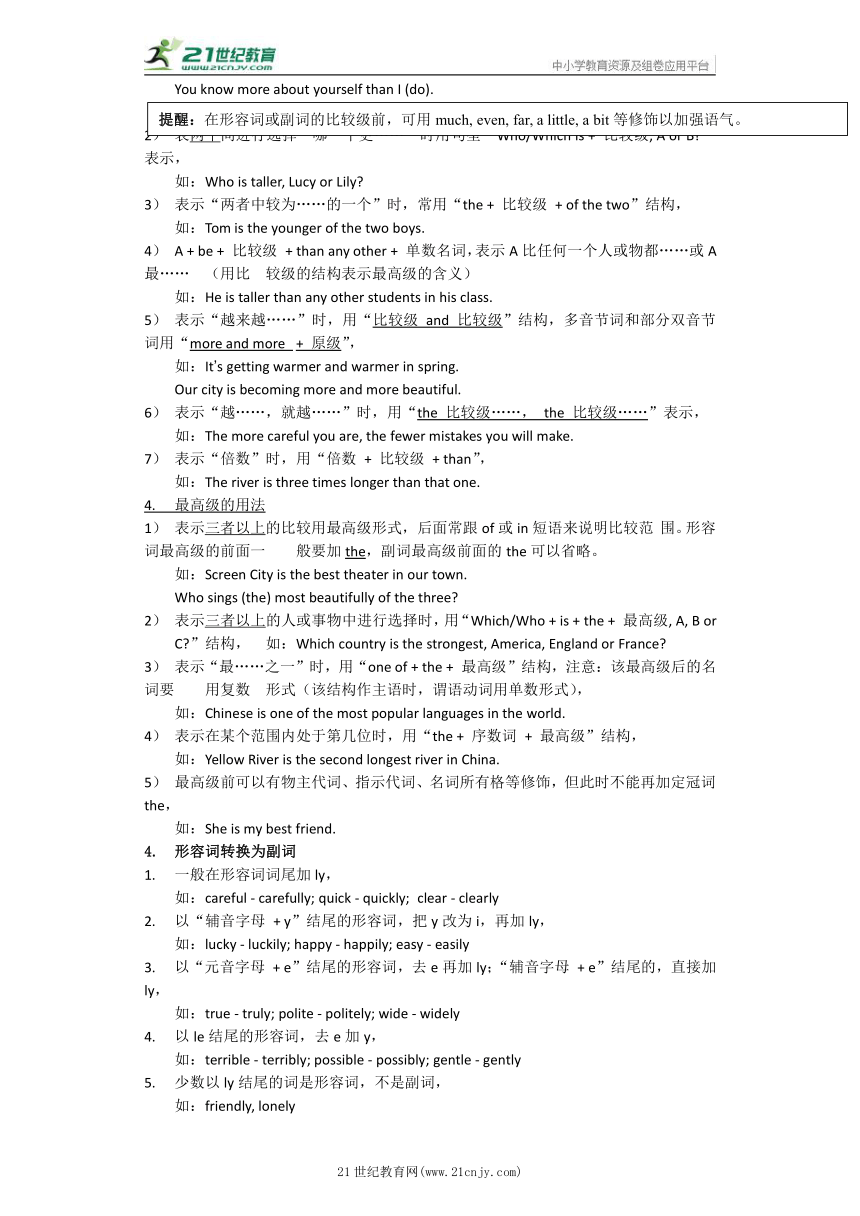
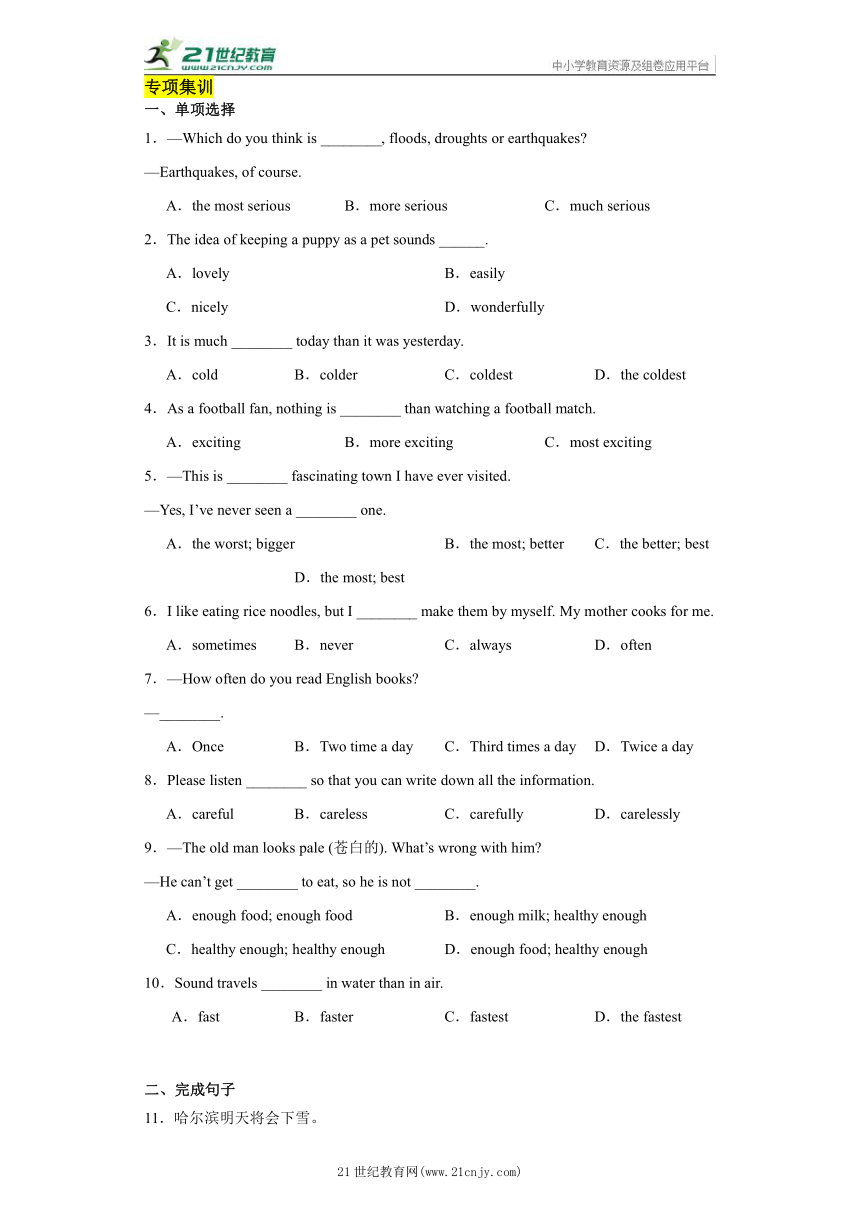
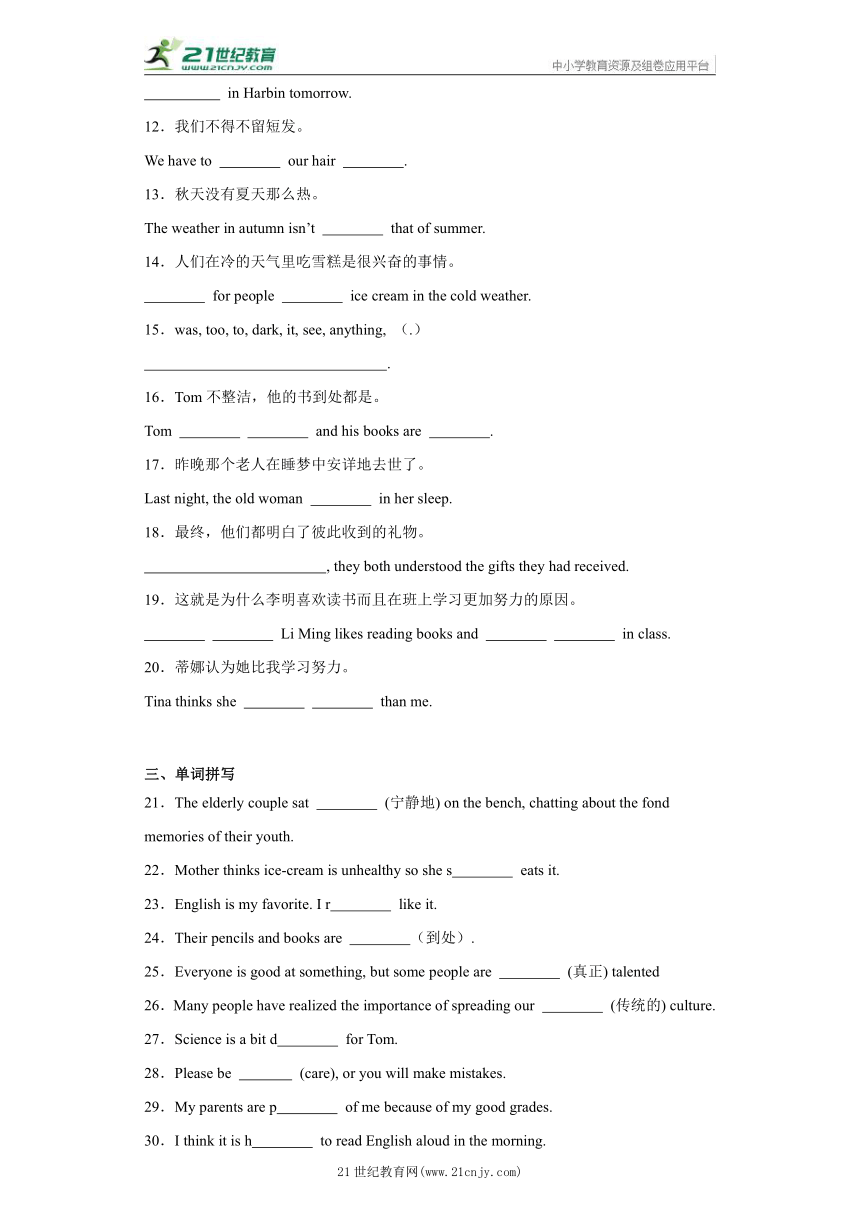
文档简介
形容词和副词
—语法知识梳理 专项集训及解析【中考英语 牛津深圳版】
知识梳理
1. 形容词及其用法
用来说明或修饰名词的词称为形容词,表示人或事物的性质、状态和特征。
1) 形容词用作定语,修饰和描述名词或代词,通常放在名词之前,复合不定代词之后,
如:This is an interesting story.
Did you do anything special yesterday
2) 形容词在句子中也常放在系动词(be动词和感官动词等)之后做表语,
如:My English is pretty good.
This kind of food smells bad but tastes delicious.
3) 形容词放在宾语之后,作宾语补足语,常与make, keep等动词连用,
如:It’s cold outside. Please keep the window closed.
I find it difficult to learn English well.
4. 某些形容词加上定冠词可以表示一类人,谓语动词用复数,
如:The old should be taken good care of.
常见的此类形容词包括:good / bad, rich / poor, young / old, deaf / blind, black / white,
living / dead
2. 副词及其用法
用来修饰动词、形容词、其他副词或全句的词称为副词,表示时间、地点、程度、方式等。
1. 副词的分类
1) 时间副词:today, tomorrow, now, ago, before, already, yet, once(曾经), last night, later,
just, after, tonight
2) 频度副词:always, usually, often, sometimes, hardly ever, seldom, never; once, twice
3) 地点副词:here, there, home, anywhere, everywhere, inside, outside, near, nearby, upstairs, downstairs, in out, away
4) 方式副词:quickly, happily, luckily, badly, easily, suddenly, slowly, politely(方式副词通常由形 容词加后缀ly构成)
5) 程度副词:too, very, much, so, rather, quite, enough, almost, little, really
6) 疑问副词:how, when, where, why, how often, how long
7) 关系副词:when, where, why(常用来引导定语从句)
2. 副词的用法
1)作状语,修饰动词、形容词或其他副词及整个句子,
如:I can’t walk quickly, because I hurt my leg yesterday.
2) 作表语,用来表明状态和位置,
如:I’m very sorry. He isn’t in at the moment.
3) 作宾语补足语(地点副词一般可用作宾语补足语)
如:Father kept him in and doing his homework.
4) 作定语,时间副词now, then以及一些地点副词可放在名词后面作定语,
如:Women there lived a terrible life in the 1920s.
3. 副词的位置
1) 修饰动词时,多数位于动词之后,及物动词的宾语之后,如:She speaks English well.
2) 频度副词(always, never, often等)通常放在行为动词之前,情态动词、be动词、助动词 之后。但是sometimes位置较灵活,也可以放在句子的开头和结尾,
如:My sister sometimes has lunch at school.
= Sometimes my sister has lunch at school.
= My sister has lunch at school sometimes.
3) 修饰形容词或副词,放在被修饰词之前,如:He has a very nice watch.
4) 作表语时,放在系动词后,如:She is out at the moment.
5) 作宾语补足语时,放在宾语之后,如:Please have them in.
6) 修饰全句时,放在句首,如:Perhaps/Maybe he’s watching TV at home.
7) enough修饰形容词或副词放在形容词、副词之后,如:He is old enough to go to school.
3. 形容词和副词的原级、比较级和最高级
形容词、副词有三个比较等级,即原级(原形)、比较级和最高级。
1. 形容词、副词比较级和最高级的构成
1) 规则变化
构成方法 原级 比较级 最高级
一般单音节词末尾加er/est tall taller tallest
以不发音的字母e结尾的单音词r/st nice nicer nicest
以一个辅音字母结尾的重读闭音节单词 双写尾字母再加er/est big bigger biggest
以“辅音字母+y”结尾的双音节词 改y为i再加er/est busy busier busiest
其他双音节词和多音节词,前面加more和most构成比较级和最高级 important more important most important
2) 不规则变化
原级 good/well bad/badly/ill much/many little far
比较级 better worse more less farther/further
最高级 best worst most least farthest/furthest
2. 原级的用法
1) 表示A与B在某一方面相同或不同时用形容词或副词的原级:
表示两者在某一方面相同,用“as...as...”的句型;表示一方在某一方面不如另一方时用“not as/so...as...” 的句型,
如:I think science is as important as maths.
It is not as/so warm today as yesterday.
2) 表示“A是B的……倍”时,用“A……+ 倍数 + as + 形容词原级 + as + B”结构(一倍用once,两 倍用twice,三倍及以上用“基数词 + times”),
如:My house is twice as large as hers.
3. 比较级的用法
1) 表示两者(人或事物)的比较,用比较级,其结构为“比较级……than”。注意 比较的对象要一 致,且当than前后使用的动词相同时,通常用助动词代替后面的动词, 或省略不写。
如:My hair is longer than Mary’s.
You know more about yourself than I (do).
2) 表两个间进行选择“哪一个更……”时用句型“Who/Which is + 比较级, A or B ”表示,
如:Who is taller, Lucy or Lily
3) 表示“两者中较为……的一个”时,常用“the + 比较级 + of the two”结构,
如:Tom is the younger of the two boys.
4) A + be + 比较级 + than any other + 单数名词,表示A比任何一个人或物都……或A最…… (用比 较级的结构表示最高级的含义)
如:He is taller than any other students in his class.
5) 表示“越来越……”时,用“比较级 and 比较级”结构,多音节词和部分双音节词用“more and more + 原级”,
如:It’s getting warmer and warmer in spring.
Our city is becoming more and more beautiful.
6) 表示“越……,就越……”时,用“the 比较级……, the 比较级……”表示,
如:The more careful you are, the fewer mistakes you will make.
7) 表示“倍数”时,用“倍数 + 比较级 + than”,
如:The river is three times longer than that one.
4. 最高级的用法
1) 表示三者以上的比较用最高级形式,后面常跟of或in短语来说明比较范 围。形容词最高级的前面一 般要加the,副词最高级前面的the可以省略。
如:Screen City is the best theater in our town.
Who sings (the) most beautifully of the three
2) 表示三者以上的人或事物中进行选择时,用“Which/Who + is + the + 最高级, A, B or C ”结构, 如:Which country is the strongest, America, England or France
3) 表示“最……之一”时,用“one of + the + 最高级”结构,注意:该最高级后的名词要 用复数 形式(该结构作主语时,谓语动词用单数形式),
如:Chinese is one of the most popular languages in the world.
4) 表示在某个范围内处于第几位时,用“the + 序数词 + 最高级”结构,
如:Yellow River is the second longest river in China.
5) 最高级前可以有物主代词、指示代词、名词所有格等修饰,但此时不能再加定冠词the,
如:She is my best friend.
4. 形容词转换为副词
1. 一般在形容词词尾加ly,
如:careful - carefully; quick - quickly; clear - clearly
2. 以“辅音字母 + y”结尾的形容词,把y改为i,再加ly,
如:lucky - luckily; happy - happily; easy - easily
3. 以“元音字母 + e”结尾的形容词,去e再加ly;“辅音字母 + e”结尾的,直接加ly,
如:true - truly; polite - politely; wide - widely
4. 以le结尾的形容词,去e加y,
如:terrible - terribly; possible - possibly; gentle - gently
5. 少数以ly结尾的词是形容词,不是副词,
如:friendly, lonely
专项集训
一、单项选择
1.—Which do you think is ________, floods, droughts or earthquakes
—Earthquakes, of course.
A.the most serious B.more serious C.much serious
2.The idea of keeping a puppy as a pet sounds ______.
A.lovely B.easily
C.nicely D.wonderfully
3.It is much ________ today than it was yesterday.
A.cold B.colder C.coldest D.the coldest
4.As a football fan, nothing is ________ than watching a football match.
A.exciting B.more exciting C.most exciting
5.—This is ________ fascinating town I have ever visited.
—Yes, I’ve never seen a ________ one.
A.the worst; bigger B.the most; better C.the better; best D.the most; best
6.I like eating rice noodles, but I ________ make them by myself. My mother cooks for me.
A.sometimes B.never C.always D.often
7.—How often do you read English books
—________.
A.Once B.Two time a day C.Third times a day D.Twice a day
8.Please listen ________ so that you can write down all the information.
A.careful B.careless C.carefully D.carelessly
9.—The old man looks pale (苍白的). What’s wrong with him
—He can’t get ________ to eat, so he is not ________.
A.enough food; enough food B.enough milk; healthy enough
C.healthy enough; healthy enough D.enough food; healthy enough
10.Sound travels ________ in water than in air.
A.fast B.faster C.fastest D.the fastest
二、完成句子
11.哈尔滨明天将会下雪。
in Harbin tomorrow.
12.我们不得不留短发。
We have to our hair .
13.秋天没有夏天那么热。
The weather in autumn isn’t that of summer.
14.人们在冷的天气里吃雪糕是很兴奋的事情。
for people ice cream in the cold weather.
15.was, too, to, dark, it, see, anything, (.)
.
16.Tom不整洁,他的书到处都是。
Tom and his books are .
17.昨晚那个老人在睡梦中安详地去世了。
Last night, the old woman in her sleep.
18.最终,他们都明白了彼此收到的礼物。
, they both understood the gifts they had received.
19.这就是为什么李明喜欢读书而且在班上学习更加努力的原因。
Li Ming likes reading books and in class.
20.蒂娜认为她比我学习努力。
Tina thinks she than me.
三、单词拼写
21.The elderly couple sat (宁静地) on the bench, chatting about the fond memories of their youth.
22.Mother thinks ice-cream is unhealthy so she s eats it.
23.English is my favorite. I r like it.
24.Their pencils and books are (到处).
25.Everyone is good at something, but some people are (真正) talented
26.Many people have realized the importance of spreading our (传统的) culture.
27.Science is a bit d for Tom.
28.Please be (care), or you will make mistakes.
29.My parents are p of me because of my good grades.
30.I think it is h to read English aloud in the morning.
21世纪教育网(www.21cnjy.com)
21世纪教育网(www.21cnjy.com)
参考答案:
1.A
【详解】句意:——你认为哪个最严重,洪水、干旱还是地震?——当然是地震。
考查形容词最高级。根据“Which do you think is..., floods, droughts or earthquakes ”可知,此处是三者之间的比较,应用最高级,the most serious符合语境。故选A。
2.A
【详解】句意:饲养小狗作为宠物这个主意听起来可爱。
考查词汇辨析。lovely形容词,可爱的;easily副词;nicely副词;wonderfully副词;感官系动词sounds后接形容词。故选A。
3.B
【详解】句意:今天比昨天冷得多。
考查形容词比较级。cold寒冷的(原级);colder比较级;coldest最高级,前面要加the;the coldest最高级。根据“It is much...today than it was yesterday.”可知,是把今天的天气和昨天的天气两者进行比较,用形容词比较级。故选B。
4.B
【详解】句意:作为一个足球迷,没有什么比看一场足球赛更令人兴奋的了。
考查比较级。根据“than”可知,空处用比较级形式,exciting的比较级为more exciting。故选B。
5.B
【详解】句意:——这是我参观过的最迷人的小镇。——是的,我从没见过更好的。
考查比较级和最高级。根据“I have ever visited”可知,在参观过的小镇中比较,用最高级,fascinating的最高级在前面加most。第二空是将这一个小镇和其他的相比较,比较级的否定表最高级,故选B。
6.B
【详解】句意:我喜欢吃米粉,但我从不自己做。我妈妈给我做。
考查副词辨析。sometimes有时;never从不;always总是;often经常。根据“My mother cooks for me.”可知,我从不自己做米粉,never符合语境。故选B。
7.D
【详解】句意:——你多久看一次英语书?——一天两次。
考查频度副词。根据“How often”可知询问的是看书的频率,表示“次数”,一次用once,两次用twice,三次用three times,后接时间范围。故选D。
8.C
【详解】句意:请仔细听以便记下所有的信息。
考查形容词和副词词义辨析。careful仔细的,形容词;careless粗心的,形容词;carefully仔细地,副词;carelessly粗心地,副词。根据“so that you can write down all the information.”可知,空处应表达仔细地听,修饰动词listen用副词形式。故选C。
9.D
【详解】句意:——老人脸色苍白。他怎么了?——他无法获得足够的食物,所以他不够健康。
考查形容词作定语和副词修饰形容词。food食物,表示“吃”时搭配动词have或eat;milk牛奶,表示“喝”时搭配动词have或drink。enough修饰名词时,位于名词前;enough修饰形容词或副词时,位于其后。根据“to eat”可知排除选项B和C;根据“he is not”可知后接形容词作表语,healthy为形容词,因此enough位于其后。故选D。
10.B
【详解】句意:声音在水中比在空气中传播得快。
考查形副三级辨析。fast快地(原级);faster更快地(比较级);(the) fastest最快地(最高级)。根据句中“than”,可知空处应填副词比较级。故选B。
11.It will snow/It will be snowy/There will be snow
【详解】根据“tomorrow”可知句子用一般将来时will do;句子主语为it,可用谓语动词snow,也可用系表结构be snowy;也可用结构there will be,主语是snow。故填It will snow/It will be snowy/There will be snow。
12. keep short
【详解】“留短发”可用“keep hair short”表示;have to后接动词原形。故填keep;short。
13.as hot as/so hot as
【详解】根据观察可知题干使用了not as/so…as句型,意为“没有”,中间接形容词或副词原级;hot“热”。故填as hot as/so hot as。
14. It’s exciting/It is exciting to eat
【详解】分析题干,考虑用固定句型“It’s + adj. + for sb. + to do sth.”,意为“做某事对某人来说是……”,其中it作形式主语,句首首字母要大写;exciting“令人兴奋的”,作表语;to eat ice cream“吃雪糕”,不定式作真正的主语;故填It’s/It is exciting;to eat。
15.It was too dark to see anything
【详解】根据标点符号可知,此句是陈述句。it作主语;was作谓语动词;too副词,修饰形容词;dark作表语;to see anything作结果状语。故填It was too dark to see anything“天太黑,什么也看不见”。
16. isn’t tidy everywhere
【详解】根据中英文对照分析,tidy“整洁的”,此处是系表结构,由“are”可知,时态是一般现在时,主语是三单,因此用isn’t表示否定;everwhere“到处”,地点副词。故填isn’t;tidy;everywhere。
17.passed away peacefully
【详解】“去世”pass away,固定短语;“安详地”peacefully,副词修饰动词短语;根据“Last night”可知,时态是一般过去时,所以谓语动词pass用过去式。故填passed away peacefully。
18.At last/Finally/In the end
【详解】分析所给中英文可知,要翻译的是“最终”。at last/finally/in the end“最后”,句首单词首字母大写。故填At last/Finally/In the end。
19. That’s why works harder
【详解】句型That’s why…表示“这就是……的原因”,why引导表语从句;动词短语work harder表示“学习更加努力”,根据“likes”可知句子采用一般现在时,根据“and”可知此处也应用动词work的三单形式works。故填That’s;why;works;harder。
20. studies harder
【详解】study学习;hard努力。观察题干可知包含宾语从句。该宾语从句使用—般现在时,主语是第三人称单数形式,因此第—个空格填studies;根据句子中的than可知第二个空格填比较级harder。故填studies;harder。
21.quietly
【详解】句意:这对老年夫妇静静地坐在长椅上,聊着他们年轻时的美好回忆。quietly意为“宁静地”,修饰动词“sat”。故填quietly。
22.(s)eldom
【详解】句意:妈妈觉得冰淇淋是不健康的,所以她很少吃。根据“Mother thinks ice-cream is unhealthy so she ... eats it.”可知,句子结构完整,应考虑副词,结合首字母提示可知,seldom“很少”符合语境,副词修饰动词eats。故填(s)eldom。
23.(r)eally
【详解】句意:英语是我的最爱。我很喜欢它。空处应用副词修饰动词,really“真正地”符合语境。故填(r)eally。
24.everywhere
【详解】句意:他们的铅笔和书到处都是。根据汉语提示可知,此处填everywhere “到处”,故填everywhere。
25.truly/really
【详解】句意:每个人都有自己擅长的事情,但是有些人真的有天赋。true/real“真正的”,形容词,这里修饰形容词“talented”用副词truly/really。故填truly/really。
26.traditional
【详解】句意:许多人已经意识到传播传统文化的重要性。traditional“传统的”,形容词作定语,修饰名词“culture”。故填traditional。
27.(d)ifficult
【详解】句意:科学对汤姆来说有点难。根据“Science is a bit ... for Tom.”及首字母可知,科学对于汤姆来说有点难;difficult“困难的”,形容词作表语。故填(d)ifficult。
28.careful
【详解】句意:请仔细,否则你会犯错的。根据“or you will make mistakes”可知,此处是提醒对方仔细一点,不然将会犯错;careful“仔细的”,形容词作表语。故填careful。
29.(p)roud
【详解】句意:我的父母为我感到骄傲,因为我的好成绩。根据“My parents are ... of me because of my good grades.”及首字母可知,我父母为我的好成绩而骄傲,proud“骄傲的,自豪的”,形容词;be proud of“以……为傲”。故填(p)roud。
30.(h)elpful
【详解】句意:我认为在早上大声朗读英语是有帮助的。根据“I think it is ... to read English aloud in the morning.”及首字母可知,在早上大声朗读英语是有用的;helpful“有帮助的,有用的”,形容词作表语。故填(h)elpful。
21世纪教育网(www.21cnjy.com)
21世纪教育网(www.21cnjy.com)
—语法知识梳理 专项集训及解析【中考英语 牛津深圳版】
知识梳理
1. 形容词及其用法
用来说明或修饰名词的词称为形容词,表示人或事物的性质、状态和特征。
1) 形容词用作定语,修饰和描述名词或代词,通常放在名词之前,复合不定代词之后,
如:This is an interesting story.
Did you do anything special yesterday
2) 形容词在句子中也常放在系动词(be动词和感官动词等)之后做表语,
如:My English is pretty good.
This kind of food smells bad but tastes delicious.
3) 形容词放在宾语之后,作宾语补足语,常与make, keep等动词连用,
如:It’s cold outside. Please keep the window closed.
I find it difficult to learn English well.
4. 某些形容词加上定冠词可以表示一类人,谓语动词用复数,
如:The old should be taken good care of.
常见的此类形容词包括:good / bad, rich / poor, young / old, deaf / blind, black / white,
living / dead
2. 副词及其用法
用来修饰动词、形容词、其他副词或全句的词称为副词,表示时间、地点、程度、方式等。
1. 副词的分类
1) 时间副词:today, tomorrow, now, ago, before, already, yet, once(曾经), last night, later,
just, after, tonight
2) 频度副词:always, usually, often, sometimes, hardly ever, seldom, never; once, twice
3) 地点副词:here, there, home, anywhere, everywhere, inside, outside, near, nearby, upstairs, downstairs, in out, away
4) 方式副词:quickly, happily, luckily, badly, easily, suddenly, slowly, politely(方式副词通常由形 容词加后缀ly构成)
5) 程度副词:too, very, much, so, rather, quite, enough, almost, little, really
6) 疑问副词:how, when, where, why, how often, how long
7) 关系副词:when, where, why(常用来引导定语从句)
2. 副词的用法
1)作状语,修饰动词、形容词或其他副词及整个句子,
如:I can’t walk quickly, because I hurt my leg yesterday.
2) 作表语,用来表明状态和位置,
如:I’m very sorry. He isn’t in at the moment.
3) 作宾语补足语(地点副词一般可用作宾语补足语)
如:Father kept him in and doing his homework.
4) 作定语,时间副词now, then以及一些地点副词可放在名词后面作定语,
如:Women there lived a terrible life in the 1920s.
3. 副词的位置
1) 修饰动词时,多数位于动词之后,及物动词的宾语之后,如:She speaks English well.
2) 频度副词(always, never, often等)通常放在行为动词之前,情态动词、be动词、助动词 之后。但是sometimes位置较灵活,也可以放在句子的开头和结尾,
如:My sister sometimes has lunch at school.
= Sometimes my sister has lunch at school.
= My sister has lunch at school sometimes.
3) 修饰形容词或副词,放在被修饰词之前,如:He has a very nice watch.
4) 作表语时,放在系动词后,如:She is out at the moment.
5) 作宾语补足语时,放在宾语之后,如:Please have them in.
6) 修饰全句时,放在句首,如:Perhaps/Maybe he’s watching TV at home.
7) enough修饰形容词或副词放在形容词、副词之后,如:He is old enough to go to school.
3. 形容词和副词的原级、比较级和最高级
形容词、副词有三个比较等级,即原级(原形)、比较级和最高级。
1. 形容词、副词比较级和最高级的构成
1) 规则变化
构成方法 原级 比较级 最高级
一般单音节词末尾加er/est tall taller tallest
以不发音的字母e结尾的单音词r/st nice nicer nicest
以一个辅音字母结尾的重读闭音节单词 双写尾字母再加er/est big bigger biggest
以“辅音字母+y”结尾的双音节词 改y为i再加er/est busy busier busiest
其他双音节词和多音节词,前面加more和most构成比较级和最高级 important more important most important
2) 不规则变化
原级 good/well bad/badly/ill much/many little far
比较级 better worse more less farther/further
最高级 best worst most least farthest/furthest
2. 原级的用法
1) 表示A与B在某一方面相同或不同时用形容词或副词的原级:
表示两者在某一方面相同,用“as...as...”的句型;表示一方在某一方面不如另一方时用“not as/so...as...” 的句型,
如:I think science is as important as maths.
It is not as/so warm today as yesterday.
2) 表示“A是B的……倍”时,用“A……+ 倍数 + as + 形容词原级 + as + B”结构(一倍用once,两 倍用twice,三倍及以上用“基数词 + times”),
如:My house is twice as large as hers.
3. 比较级的用法
1) 表示两者(人或事物)的比较,用比较级,其结构为“比较级……than”。注意 比较的对象要一 致,且当than前后使用的动词相同时,通常用助动词代替后面的动词, 或省略不写。
如:My hair is longer than Mary’s.
You know more about yourself than I (do).
2) 表两个间进行选择“哪一个更……”时用句型“Who/Which is + 比较级, A or B ”表示,
如:Who is taller, Lucy or Lily
3) 表示“两者中较为……的一个”时,常用“the + 比较级 + of the two”结构,
如:Tom is the younger of the two boys.
4) A + be + 比较级 + than any other + 单数名词,表示A比任何一个人或物都……或A最…… (用比 较级的结构表示最高级的含义)
如:He is taller than any other students in his class.
5) 表示“越来越……”时,用“比较级 and 比较级”结构,多音节词和部分双音节词用“more and more + 原级”,
如:It’s getting warmer and warmer in spring.
Our city is becoming more and more beautiful.
6) 表示“越……,就越……”时,用“the 比较级……, the 比较级……”表示,
如:The more careful you are, the fewer mistakes you will make.
7) 表示“倍数”时,用“倍数 + 比较级 + than”,
如:The river is three times longer than that one.
4. 最高级的用法
1) 表示三者以上的比较用最高级形式,后面常跟of或in短语来说明比较范 围。形容词最高级的前面一 般要加the,副词最高级前面的the可以省略。
如:Screen City is the best theater in our town.
Who sings (the) most beautifully of the three
2) 表示三者以上的人或事物中进行选择时,用“Which/Who + is + the + 最高级, A, B or C ”结构, 如:Which country is the strongest, America, England or France
3) 表示“最……之一”时,用“one of + the + 最高级”结构,注意:该最高级后的名词要 用复数 形式(该结构作主语时,谓语动词用单数形式),
如:Chinese is one of the most popular languages in the world.
4) 表示在某个范围内处于第几位时,用“the + 序数词 + 最高级”结构,
如:Yellow River is the second longest river in China.
5) 最高级前可以有物主代词、指示代词、名词所有格等修饰,但此时不能再加定冠词the,
如:She is my best friend.
4. 形容词转换为副词
1. 一般在形容词词尾加ly,
如:careful - carefully; quick - quickly; clear - clearly
2. 以“辅音字母 + y”结尾的形容词,把y改为i,再加ly,
如:lucky - luckily; happy - happily; easy - easily
3. 以“元音字母 + e”结尾的形容词,去e再加ly;“辅音字母 + e”结尾的,直接加ly,
如:true - truly; polite - politely; wide - widely
4. 以le结尾的形容词,去e加y,
如:terrible - terribly; possible - possibly; gentle - gently
5. 少数以ly结尾的词是形容词,不是副词,
如:friendly, lonely
专项集训
一、单项选择
1.—Which do you think is ________, floods, droughts or earthquakes
—Earthquakes, of course.
A.the most serious B.more serious C.much serious
2.The idea of keeping a puppy as a pet sounds ______.
A.lovely B.easily
C.nicely D.wonderfully
3.It is much ________ today than it was yesterday.
A.cold B.colder C.coldest D.the coldest
4.As a football fan, nothing is ________ than watching a football match.
A.exciting B.more exciting C.most exciting
5.—This is ________ fascinating town I have ever visited.
—Yes, I’ve never seen a ________ one.
A.the worst; bigger B.the most; better C.the better; best D.the most; best
6.I like eating rice noodles, but I ________ make them by myself. My mother cooks for me.
A.sometimes B.never C.always D.often
7.—How often do you read English books
—________.
A.Once B.Two time a day C.Third times a day D.Twice a day
8.Please listen ________ so that you can write down all the information.
A.careful B.careless C.carefully D.carelessly
9.—The old man looks pale (苍白的). What’s wrong with him
—He can’t get ________ to eat, so he is not ________.
A.enough food; enough food B.enough milk; healthy enough
C.healthy enough; healthy enough D.enough food; healthy enough
10.Sound travels ________ in water than in air.
A.fast B.faster C.fastest D.the fastest
二、完成句子
11.哈尔滨明天将会下雪。
in Harbin tomorrow.
12.我们不得不留短发。
We have to our hair .
13.秋天没有夏天那么热。
The weather in autumn isn’t that of summer.
14.人们在冷的天气里吃雪糕是很兴奋的事情。
for people ice cream in the cold weather.
15.was, too, to, dark, it, see, anything, (.)
.
16.Tom不整洁,他的书到处都是。
Tom and his books are .
17.昨晚那个老人在睡梦中安详地去世了。
Last night, the old woman in her sleep.
18.最终,他们都明白了彼此收到的礼物。
, they both understood the gifts they had received.
19.这就是为什么李明喜欢读书而且在班上学习更加努力的原因。
Li Ming likes reading books and in class.
20.蒂娜认为她比我学习努力。
Tina thinks she than me.
三、单词拼写
21.The elderly couple sat (宁静地) on the bench, chatting about the fond memories of their youth.
22.Mother thinks ice-cream is unhealthy so she s eats it.
23.English is my favorite. I r like it.
24.Their pencils and books are (到处).
25.Everyone is good at something, but some people are (真正) talented
26.Many people have realized the importance of spreading our (传统的) culture.
27.Science is a bit d for Tom.
28.Please be (care), or you will make mistakes.
29.My parents are p of me because of my good grades.
30.I think it is h to read English aloud in the morning.
21世纪教育网(www.21cnjy.com)
21世纪教育网(www.21cnjy.com)
参考答案:
1.A
【详解】句意:——你认为哪个最严重,洪水、干旱还是地震?——当然是地震。
考查形容词最高级。根据“Which do you think is..., floods, droughts or earthquakes ”可知,此处是三者之间的比较,应用最高级,the most serious符合语境。故选A。
2.A
【详解】句意:饲养小狗作为宠物这个主意听起来可爱。
考查词汇辨析。lovely形容词,可爱的;easily副词;nicely副词;wonderfully副词;感官系动词sounds后接形容词。故选A。
3.B
【详解】句意:今天比昨天冷得多。
考查形容词比较级。cold寒冷的(原级);colder比较级;coldest最高级,前面要加the;the coldest最高级。根据“It is much...today than it was yesterday.”可知,是把今天的天气和昨天的天气两者进行比较,用形容词比较级。故选B。
4.B
【详解】句意:作为一个足球迷,没有什么比看一场足球赛更令人兴奋的了。
考查比较级。根据“than”可知,空处用比较级形式,exciting的比较级为more exciting。故选B。
5.B
【详解】句意:——这是我参观过的最迷人的小镇。——是的,我从没见过更好的。
考查比较级和最高级。根据“I have ever visited”可知,在参观过的小镇中比较,用最高级,fascinating的最高级在前面加most。第二空是将这一个小镇和其他的相比较,比较级的否定表最高级,故选B。
6.B
【详解】句意:我喜欢吃米粉,但我从不自己做。我妈妈给我做。
考查副词辨析。sometimes有时;never从不;always总是;often经常。根据“My mother cooks for me.”可知,我从不自己做米粉,never符合语境。故选B。
7.D
【详解】句意:——你多久看一次英语书?——一天两次。
考查频度副词。根据“How often”可知询问的是看书的频率,表示“次数”,一次用once,两次用twice,三次用three times,后接时间范围。故选D。
8.C
【详解】句意:请仔细听以便记下所有的信息。
考查形容词和副词词义辨析。careful仔细的,形容词;careless粗心的,形容词;carefully仔细地,副词;carelessly粗心地,副词。根据“so that you can write down all the information.”可知,空处应表达仔细地听,修饰动词listen用副词形式。故选C。
9.D
【详解】句意:——老人脸色苍白。他怎么了?——他无法获得足够的食物,所以他不够健康。
考查形容词作定语和副词修饰形容词。food食物,表示“吃”时搭配动词have或eat;milk牛奶,表示“喝”时搭配动词have或drink。enough修饰名词时,位于名词前;enough修饰形容词或副词时,位于其后。根据“to eat”可知排除选项B和C;根据“he is not”可知后接形容词作表语,healthy为形容词,因此enough位于其后。故选D。
10.B
【详解】句意:声音在水中比在空气中传播得快。
考查形副三级辨析。fast快地(原级);faster更快地(比较级);(the) fastest最快地(最高级)。根据句中“than”,可知空处应填副词比较级。故选B。
11.It will snow/It will be snowy/There will be snow
【详解】根据“tomorrow”可知句子用一般将来时will do;句子主语为it,可用谓语动词snow,也可用系表结构be snowy;也可用结构there will be,主语是snow。故填It will snow/It will be snowy/There will be snow。
12. keep short
【详解】“留短发”可用“keep hair short”表示;have to后接动词原形。故填keep;short。
13.as hot as/so hot as
【详解】根据观察可知题干使用了not as/so…as句型,意为“没有”,中间接形容词或副词原级;hot“热”。故填as hot as/so hot as。
14. It’s exciting/It is exciting to eat
【详解】分析题干,考虑用固定句型“It’s + adj. + for sb. + to do sth.”,意为“做某事对某人来说是……”,其中it作形式主语,句首首字母要大写;exciting“令人兴奋的”,作表语;to eat ice cream“吃雪糕”,不定式作真正的主语;故填It’s/It is exciting;to eat。
15.It was too dark to see anything
【详解】根据标点符号可知,此句是陈述句。it作主语;was作谓语动词;too副词,修饰形容词;dark作表语;to see anything作结果状语。故填It was too dark to see anything“天太黑,什么也看不见”。
16. isn’t tidy everywhere
【详解】根据中英文对照分析,tidy“整洁的”,此处是系表结构,由“are”可知,时态是一般现在时,主语是三单,因此用isn’t表示否定;everwhere“到处”,地点副词。故填isn’t;tidy;everywhere。
17.passed away peacefully
【详解】“去世”pass away,固定短语;“安详地”peacefully,副词修饰动词短语;根据“Last night”可知,时态是一般过去时,所以谓语动词pass用过去式。故填passed away peacefully。
18.At last/Finally/In the end
【详解】分析所给中英文可知,要翻译的是“最终”。at last/finally/in the end“最后”,句首单词首字母大写。故填At last/Finally/In the end。
19. That’s why works harder
【详解】句型That’s why…表示“这就是……的原因”,why引导表语从句;动词短语work harder表示“学习更加努力”,根据“likes”可知句子采用一般现在时,根据“and”可知此处也应用动词work的三单形式works。故填That’s;why;works;harder。
20. studies harder
【详解】study学习;hard努力。观察题干可知包含宾语从句。该宾语从句使用—般现在时,主语是第三人称单数形式,因此第—个空格填studies;根据句子中的than可知第二个空格填比较级harder。故填studies;harder。
21.quietly
【详解】句意:这对老年夫妇静静地坐在长椅上,聊着他们年轻时的美好回忆。quietly意为“宁静地”,修饰动词“sat”。故填quietly。
22.(s)eldom
【详解】句意:妈妈觉得冰淇淋是不健康的,所以她很少吃。根据“Mother thinks ice-cream is unhealthy so she ... eats it.”可知,句子结构完整,应考虑副词,结合首字母提示可知,seldom“很少”符合语境,副词修饰动词eats。故填(s)eldom。
23.(r)eally
【详解】句意:英语是我的最爱。我很喜欢它。空处应用副词修饰动词,really“真正地”符合语境。故填(r)eally。
24.everywhere
【详解】句意:他们的铅笔和书到处都是。根据汉语提示可知,此处填everywhere “到处”,故填everywhere。
25.truly/really
【详解】句意:每个人都有自己擅长的事情,但是有些人真的有天赋。true/real“真正的”,形容词,这里修饰形容词“talented”用副词truly/really。故填truly/really。
26.traditional
【详解】句意:许多人已经意识到传播传统文化的重要性。traditional“传统的”,形容词作定语,修饰名词“culture”。故填traditional。
27.(d)ifficult
【详解】句意:科学对汤姆来说有点难。根据“Science is a bit ... for Tom.”及首字母可知,科学对于汤姆来说有点难;difficult“困难的”,形容词作表语。故填(d)ifficult。
28.careful
【详解】句意:请仔细,否则你会犯错的。根据“or you will make mistakes”可知,此处是提醒对方仔细一点,不然将会犯错;careful“仔细的”,形容词作表语。故填careful。
29.(p)roud
【详解】句意:我的父母为我感到骄傲,因为我的好成绩。根据“My parents are ... of me because of my good grades.”及首字母可知,我父母为我的好成绩而骄傲,proud“骄傲的,自豪的”,形容词;be proud of“以……为傲”。故填(p)roud。
30.(h)elpful
【详解】句意:我认为在早上大声朗读英语是有帮助的。根据“I think it is ... to read English aloud in the morning.”及首字母可知,在早上大声朗读英语是有用的;helpful“有帮助的,有用的”,形容词作表语。故填(h)elpful。
21世纪教育网(www.21cnjy.com)
21世纪教育网(www.21cnjy.com)
同课章节目录
- 词法
- 名词
- 动词和动词短语
- 动词语态
- 动词时态
- 助动词和情态动词
- 非谓语动词
- 冠词
- 代词
- 数词和量词
- 形容词副词及其比较等级
- 介词和介词短语
- 连词和感叹词
- 构词法
- 相似、相近词比较
- 句法
- 陈述句
- 一般疑问句和否定疑问句
- 特殊疑问句及选择疑问句
- 反意疑问句
- 存在句(There be句型)
- 宾语从句
- 定语从句
- 状语从句
- 主谓一致问题
- 简单句
- 并列句
- 复合句
- 主谓一致
- 主、表语从句
- 名词性从句
- 直接引语和间接引语
- 虚拟语气
- 感叹句
- 强调句
- 倒装句
- 祈使句
- 句子的成分
- 句子的分类
- 题型专区
- 单项选择部分
- 易错题
- 完形填空
- 阅读理解
- 词汇练习
- 听说训练
- 句型转换
- 补全对话
- 短文改错
- 翻译
- 书面表达
- 任务型阅读
- 语法填空
- 其他资料
